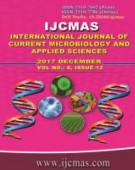


 National Academy of Agricultural Sciences (NAAS)
National Academy of Agricultural Sciences (NAAS)

|
PRINT ISSN : 2319-7692
Online ISSN : 2319-7706 Issues : 12 per year Publisher : Excellent Publishers Email : editorijcmas@gmail.com / submit@ijcmas.com Editor-in-chief: Dr.M.Prakash Index Copernicus ICV 2018: 95.39 NAAS RATING 2020: 5.38 |
To evaluate the effect of distillery RSW on soil microbial properties and yield of paddy in a sodic Vertisol a field study was conducted at Agricultural Research Station, Gangavathi, Koppal, Karnataka. The treatment consists of five graded levels of RSW, viz., 1.0, 1.5, 2.0, 2.5 and 3.0 lakh L ha-1 (T1 to T5), gypsum @ 50 and 100 per cent of gypsum requirement (GR) (T6 and T7) and control (T8). The RDF applied to these treatments was common. The surface soil samples collected at harvest of the crop were examined for changes in physico-chemical properties, bacteria, fungi, actinomycetes, soil microbial biomass carbon, dehydrogease, urease and phosphatase activities. The soil pH, Ex-Na and ESP decreased with the levels of RSW application and decrement was linear with the proportion of RSW application. Apart from decreasing soil ESP it also enhanced the soil microbial activity. In general, the bacteria, fungi, actinomycetes, urease and phosphatase increased with increase in RSW application only up to 2.5 lakh L ha-1. However, soil salinity build up was observed with the increased levels of RSW application. Paddy grain yield was significantly higher in T4 and T3 compared to other treatments, while significantly higher straw yield was recorded in T5 compared to other treatments except T4.
 |
 |
 |
 |
 |